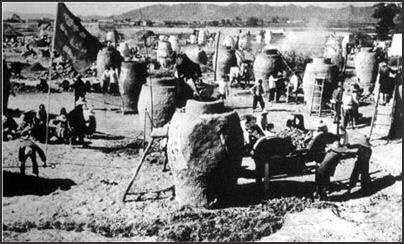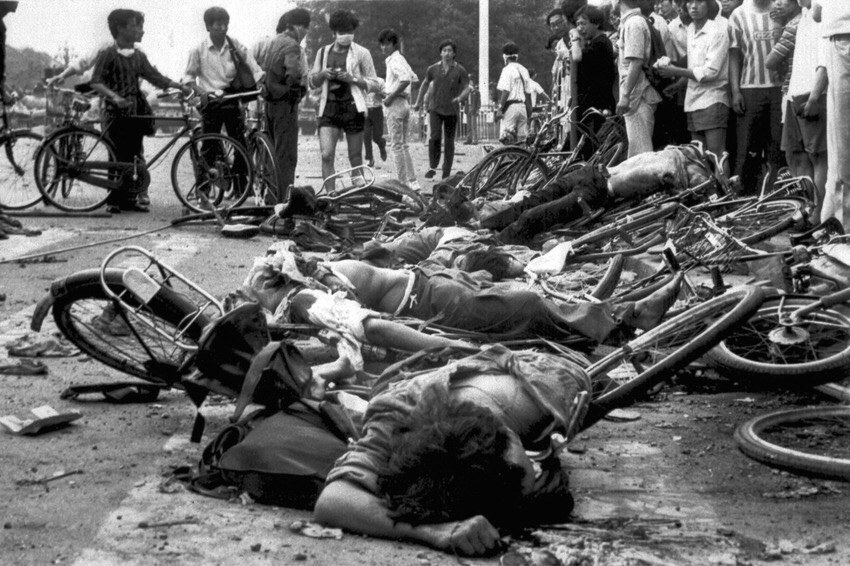From the years 1949-1989 problems aroused economically in Mao’s Great Leap Forward, and significantly increased politically in the Cultural Revolution of 1966. Problems were also apparent economically and socially by Deng’s reforms but there was relative stasis in this period in comparison to the former events. Though the Democracy Movement saw a dramatic heightening in political and social problems but a lessening in problems affecting the economy.
To begin with, Mao’s Great Leap Forward created a number of economic problems. The Great Leap Forward was a way of establishing China into an industrial superpower by using the massive man power of the country and saw the introduction of the Backyard Steel Furnace Campaign which was in itself a failure because the steel produced was often of poor quality and as a result of people spending time making steel, crops were neglected which significantly had an impact on the famine which took the lives of 30 million people. Thus this is enough to prove that Mao’s Great Leap Forward which aimed to boost China’s social standing in the world caused significant economic problems because of the lack of planning, coupled with the onset of famine.

Furthermore, the Cultural Revolution saw Mao create problems in China politically. The Cultural Revolution saw Mao’s Red Guards stirring up trouble in China through the promotion of violence to prevent the spread of Western ideologies and the sickening ideas of the moderates. This was seen when Red Guards would shave the heads of women who wore Western hairstyles and ransack shops selling Western merchandise. As well as this the Red Guards attacked the Communist Party, for instance Liu Shaoqi who was labelled as the number one enemy of communism was expelled from the party. Almost anyone in authority was targeted and it was Mao’s way of re-establishing his grip on China and moving away from the moderate ideologies. Thus there is significant regression in China’s political system because of Mao’s creation of the Red Guards to attack modernisation and to revert back to his own idea of communism which he believed to be pure.
Moreover, although Deng’s reforms did show progression in China’s economy, it did cause economic problems as well. A television set was worth two years worth wages of the average Chinese citizen as well as a bicycle being worth one month’s worth. Modernisation brought western problems such as rising crime rates and even football hooliganism. Unemployment stood at 12% and inequalities in wealth and wages increased the potential for social conflict as was seen in 1985 when bus drivers went on strike, angered by the fact that they were supplied wages that were half those of taxi drivers. Deng’s reforms caused social problems and economic problems due to westernisation but in the grand scheme of things there was stasis in this period in comparison to the heightening of problems caused by Mao.
Deng created problems during the Democracy Movement. The Democracy Movement was set up as a result of Deng’s lack of motive to make changes to the political system in China. The Democracy Wall allowed people to express their anti-party feelings and as well as this the death of Hu Yaobang led to mass sit-ins in Tiananmen Square. Deng was insistent on resisting these students as he felt that this opposition threatened his position in the CCP. Although Deng was an economic reformer, he was a communist hardliner and thus he decided to stir up trouble in Tiananmen Square by using martial law to force the “rebels” out as well as it being a deterrent to all those who intend to challenge the party. Deng thus increased social problems as well as political because of his refusal to modernise the political system which thus ended with the massacre at Tiananmen Square.

In conclusion Mao seems to create economic problems with the Great Leap Forward which are then added to with the social conflict he causes with the creation of the Red Guards in the Cultural Revolution. Deng created problems with his reforms but these were less serious than the problems Mao caused: however Deng created serious problems in China by refusing to modernise the political system which ultimately led to the Democracy Movement and the Tiananmen Square Massacre in 1989.